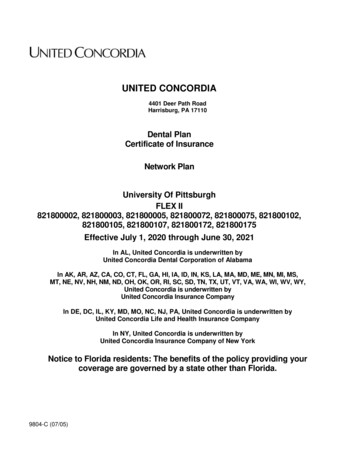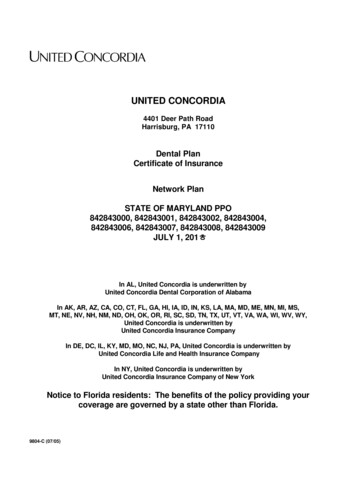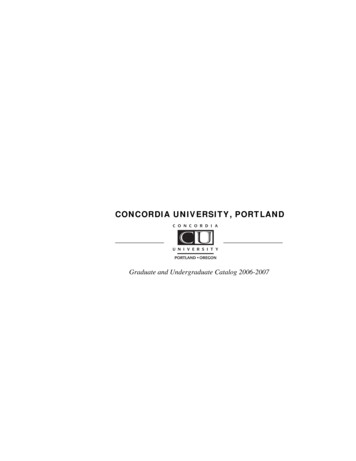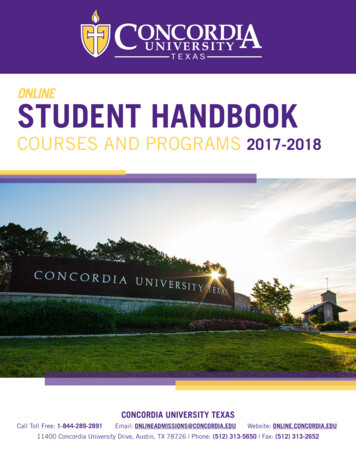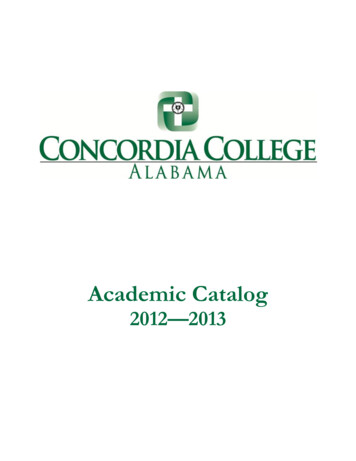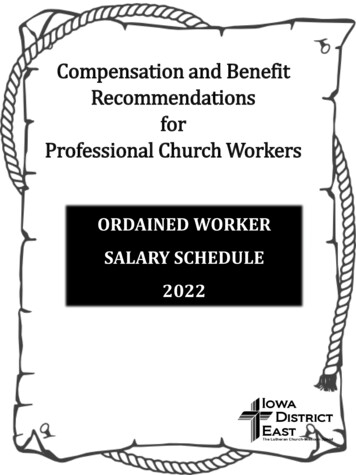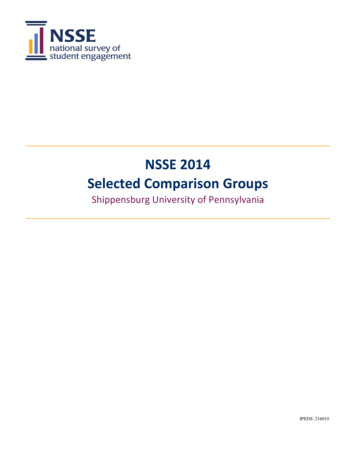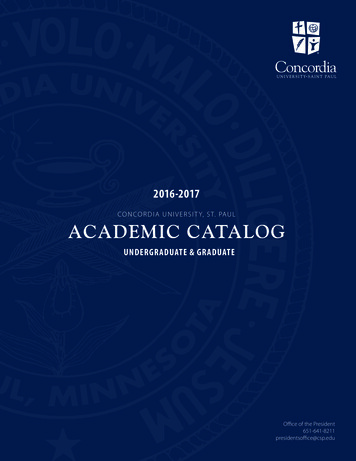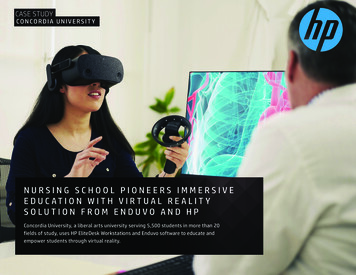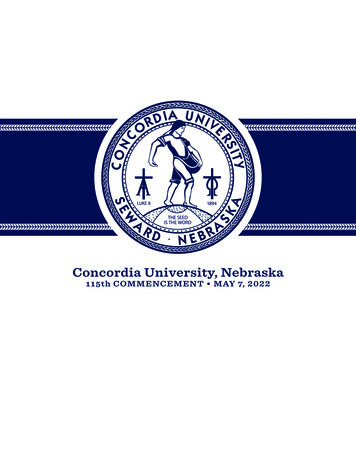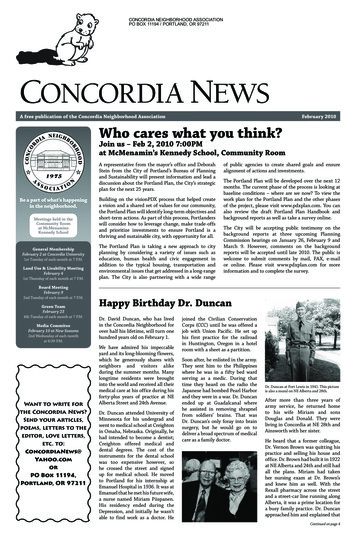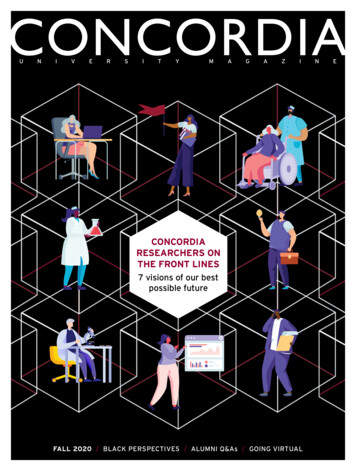
Transcription
UNIVERSITYMAGAZICONCORDIARESEARCHERS ONTHE FRONT LINES7 visions of our bestpossible futureFALL 2020 / BLACK PERSPECTIVES / ALUMNI Q&As / GOING VIRTUALNE
MAJORPARTNERThe leadingevent on digitaltransformationFrom October 13 to 18, 2020Montreal Digital Week — Online esHours of contents2020 TOPICSCybersecurity and Digital Identity / Sustainable Development /AI, IoT and 4.0 / City of the Future / Health MedTech /Education EdTech / Future of Work / Creativity ISEA2020 / FinTechR E S E R V E Y O U R e - P L A CEc2 fall 2020 concordia university magazineMTLCONNECT.CA
U N I V E R S I T Y20OUR DIGITALFUTUREDiscover howConcordia’s nextgen approacheducates studentsin the age ofCOVID-19.2020 VISIONM A G A Z I N EBLACKPERSPECTIVESINITIATIVEScholar and communityorganizer Annick MaugileFlavien powers change atConcordia — and beyond.182428The John MolsonSchool of Businesscelebrates amilestone tripleanniversary.36INTERVIEW:HELEN ANTONIOUMeet the new chair ofConcordia’s Boardof Governors.FACULTY ON THEFRONT LINESHow Concordia-ledresearch can serve apost-COVID-19 world.WELCOME TOMTL CONNECT 202038fall 2020volume 44Concordia and a majordigital-arts festivalpartner up this fall.number e spring 2020 edition of ConcordiaUniversity Magazine referred to an event(“Stingers standout!,” p. 30) since postponedbecause of COVID-19: the 2020 ConcordiaSports Hall of Fame induction ceremony,originally scheduled for September 12.2NEWS BITES6NEWS Q&As10THE CAMPAIGN FOR CONCORDIA12IN GOOD COMPANY16SETTING AN EXAMPLE40ALUMNI NEWS48STUDENT POETRY50FACULTY SPOTLIGHTS54ALUMNI UPDATES60IN MEMORIAM62WORDS & MUSIC64ENOUGH SAID
NEWS BITESUNIVERSITY MAGAZINEConcordia University Magazinewelcomes your comments.Concordia University Magazineis published three times a yearfor alumni and friends. Opinionsexpressed herein do not necessarilyreflect the views of the university,or its alumni association.Please address editorialcorrespondence to:The Editor, ConcordiaUniversity Magazine1455 De Maisonneuve Blvd. W.Montreal, QC H3G 1M8Email: magazine@concordia.caAdvertising: advertising.alumni@concordia.caDesign: Christopher Alleyneand Trevor BrowneSOCIOLOGY PHD CANDIDATE JAMILAH DEI-SHARPE, MA 19, HAS CREATED THE NATIONAL BLACK GRADUATENETWORK TO CONNECT BLACK GRADUATE STUDENTS AND STUDENTS ENROLLED IN BLACK STUDIES.Editors: Ian Harrison andMarta SamuelContributors: Marco Buttice, MollyHamilton and Joseph LégerPhotos by Concordia or courtesyof the subject (unless specified) 2 . 5 M I L L I O N F O R C O N C O R D I A- L E D R E S E A R C H“Deindustrialization and the Politics of Our Time,” a seven-year project led by historyprofessor Steven High at Concordia’s Centre for Oral History and Digital Storytelling,received considerable financial support from the Social Sciences and HumanitiesResearch Council of Canada (SSHRC). One of the objectives of High’s research is toinvestigate how race, gender and class intersect with the decline of industrial activityand the rise of right-wing populism (more on p. 28).T21-65835Keep in touchTo update your address, emailor communication preferences— including where and how youreceive the magazine — please visitour new Alumni and Friends servicehub at engage.concordia.ca.N E W C L A S S R O O M S A N D S T U DY S PA C EConcordia’s Facilities Management, which oversees all aspects ofthe university’s physical environment, is constantly at work to createpractical urban spaces for academics and students. The newest exampleis now underway at the corner of Guy and Ste. Catherine streets inMontreal’s Quartier Concordia, where, despite pandemic-relatedconstruction challenges, the basement of the Faubourg Building (FB)will be converted to accommodate open and modern areasfor courses and group study before the fall 2021 term.CREE LAND PROTECTEDMembers of the Cree community ofWemindji have worked with MonicaMulrennan, a professor in the Departmentof Geography, Planning and Environment,and other researchers to protect over30,000 square kilometres of territoryVIRTUAL INDIGENOUS ART EXHIBITIONConcordia alumni contributed to the online Contemporary Native ArtBiennial this past April. The multi-gallery event’s theme centred onIndigenous kinship and resistance in the face of colonialism.2 fall 2020 concordia university magazinefrom large-scale resource development.The project is premised on therecognition of Indigenous authority overtraditional lands and waters.
H E A D E D T O H A R VA R DShide Salimi, MASc 15, PhD 20, the recipient of Concordia’s Stand-Out Graduate Research Award, the Concordia Merit Scholarship,the Graduate Student Mobility Award and the Concordia AcceleratorAward, assumed a postdoctoral fellowship at Harvard Universitylast January. The focus of Salimi’s research is on smarter and moresustainable energy-efficient building systems.S A F E R S U R FA C E S S L O W T R A N S M I S S I O NMaterials with antibacterial and antiviral capabilities, like copperand titanium oxide, can be deployed to make surfaces moreresistant to COVID-19, say researchers at the Concordia-basedNSERC Green Surface Engineering for Advanced Manufacturing(Green-SEAM) Network. Their work aims to better protectfront-line workers in high-traffic public spaces (more on p. 28).ANITA NOWAK, GRDIP 99 (LEFT), AND DAUGHTER ANNIKAMEGRELISHVILI-NOWAK, MET CALIFORNIA SENATOR KAMALA HARRISAT NEWARK LIBERTY INTERNATIONAL AIRPORT. “SHE WAS GRACIOUS,CHEERFUL AND ENERGETIC,” SAYS NOWAK OF THE 2020 DEMOCRATICNOMINEE FOR VICE-PRESIDENT OF THE UNITED STATES, WHOGRADUATED FROM MONTREAL’S WESTMOUNT HIGH SCHOOL IN 1981.S U S TA I N A B I L I T YACTION FUNDF L A G S H I P P R O G R A M TA K E S F L I G H T O N L I N ETwelve research projects (five graduate, sevenThe long-standing flagship of the John Molson Executive Centre (JMEC),the Airport Executive Leadership Program (AELP), made a successfulonline pivot in the wake of the COVID-19 pandemic. Virtual sessionsprovided a new opportunity for aviation executives to improve theirstrategic management skills. “Participants are staying 100 per cent active,”said Sandra Nichol, executive director of JMEC.undergraduate) spanning Concordia’s fourfaculties have been selected for the 2019-20Sustainability Research Awards. The projectsaddressed various environmental-related themes,including community development, food security,labour issues and sustainable consumption.ADAM BASANTA, MA 13, AND SABRINA RATTÉ, BFA 05, MFA 12, WERE HONOURED WITH THE 2020 SOBEY ART AWARD.ALL 25 NOMINEES WERE ANNOUNCED AS CO-WINNERS AFTER THE ONSET OF COVID-19. (PICTURED IS RATTÉ’S NUÉE, 2020.)concordia university magazine fall 2020 3
NEWS BITESANTI-RACISMEFFORTSResearchers at Concordiahave co-developed anddisseminated PROFILE,a multimedia tool kitdesigned to combatracial and social profilingSASHA ANDREWS (PICTURED WITH HER FAMILY), AN ACCOMPLISHED NATIONAL TEAM PLAYER AND FORMER PROFESSIONALATHLETE, RECENTLY JOINED THE STINGERS WOMEN’S SOCCER PROGRAM AS AN ASSISTANT COACH.NEW PROGRAM FOR AMORE ACCESSIBLE FUTUREArseli Dokumaci, Concordia’s new CanadaResearch Chair (CRC) in Critical DisabilityStudies and Media Technologies and an assistantprofessor of communication studies in theFaculty of Arts and Science, will lead a researchby compelling users toconfront their consciousor unconscious biases.B O O S T F O R E N V I R O N M E N TA LSCIENCE STUDENTSA scientific training program launched by Concordia and FutureEarth will be funded with 1.65 million over six years by NSERC’sCollaborative Research and Training Experience (CREATE)program. The grant will further scientific research on climate,biodiversity and other critical sustainability goals as well as supportthe career development of students and postdoctoral fellows.program to explore the use of new mediatechnologies within disability movements,cultures, scholarships and activism.BETTER WHEELSFO R M A R S R OV E RWhen a NASA mission to Mars blasted off from CapeCanaveral, Florida, on July 30, the rover on board sporteda new wheel design — thanks, in part, to Concordiaresearcher Krzysztof Skonieczny. “We came up withways to improve performance on Mars’s loose and rockysoil,” explained Skonieczny, associate professor and TierII Canada Research Chair in Aerospace Robotics in theDepartment of Electrical and Computer Engineering at theGina Cody School of Engineering and Computer Science.4 fall 2020 concordia university magazineALICE THE CORGI DEVOURED THE SPRING 2020ISSUE OF CONCORDIA UNIVERSITY MAGAZINE.
F R O M CA N C E R R ES E A R C H TO COV I D -1 9Two international postdocs stranded in Canada because of COVID-19 have successfully switched their research focusfrom cancer to the novel coronavirus. Gurudeeban Selvaraj and Satyavani Kaliamurthi arrived in Montreal in lateDecember on a 24-week Mitacs Globalink Research Internship to study at Concordia’s Centre for Research in MolecularModeling (CERMM) under the supervision of chemistry and biochemistry professor Gilles Peslherbe. The pair areusing computer modelling and simulations to look into molecular approaches health scientists can exploit to developa vaccine or search for an antiviral protein-inhibitor drug. “As the fight against COVID-19 is a worldwide effort, it isgratifying to see our researchers’ efforts in responding to this public health crisis,” said Paula Wood-Adams, Concordia’sinterim vice-president of research and graduate studies.G RA D W I N S G OV E R N O RG E N E R A L’ S A C A D E M I CGOLD MEDALIrene Rozsa, MA 11, PhD 20, won theGovernor General’s Academic Gold Medalthis past June. The Film and Moving ImageStudies program alumna earned the prize forachieving the highest academic standingat the graduate level among students at theuniversity completing a dissertation. “I amgrateful to Concordia for giving me first-handaccess to an intellectual community wherescholarship, professional dedication andkindness coexist,” said Rozsa, whose researchfocuses on the transnational dimensions ofvisual culture in Latin America.DIAMOND JUBILEEFOR POLITICAL SCIENCEFAY ARJOMANDI, BENG 98, THE CONCORDIA UNIVERSITY ALUMNI ASSOCIATION 2018ALUMNA OF THE YEAR, AND THE PRESIDENT AND CEO OF MIMIK, DEVELOPED PANDIMIK,THE WORLD’S FIRST ANONYMIZED INFECTION-TRACING APP DESIGNED FOR COVID-19.D O C T O R A L C A N D I D AT ES C O R E S D I S T I N G U I S H E D AWA R DSoroosh Shahtalebi, a doctoral candidate at the Concordia Institutefor Information Systems Engineering, has been awarded the LouisBerlinguet prize from the Fonds de recherche du Québec – Natureet technologies (FRQNT). Shahtalebi was recognized for his article“PHTNet: Characterization and Deep Mining of Involuntary PathologicalHand Tremor Using Recurrent Neural Network Models,” which appearedearlier this year in the open-access journal Scientific Reports. Under thesupervision of associate professor Arash Mohammadi, Shahtalebi’s workat the Intelligent Signal and Information Processing (I-SIP) Lab appliesmachine-learning solutions to problems in medicine and health care.This autumn marks the 60th anniversary ofConcordia’s Department of Political Science.Founded by Distinguished ProfessorHenri P. Habib in 1961, the departmentboasts a number of notable alumni, includingPeter Schiefke, BA 07, environmentalist andmember of Parliament; Leah Olson-Friesen,BA 98, MA 00, chief operating officer atLumeca Health, and one of Concordia’sTop 50 Under 50 Shaping Business; andJacques Chagnon, BA 75, former memberof the National Assembly of Quebec.concordia university magazine fall 2020 5
NEWS Q&AsMélie Tiacohhas a passionfor fashionand financemajor and computer science as a minorbecause I’ve always wanted to be a traderon the New York Stock Exchange.You may have seen thisgrad on the catwalkI love challenges. I’m currently aCFA Level III candidate. I have theadvantage of a flexible schedule thatI try to manage the best I can. It isn’talways easy, but I take it step by step.IAN HARRISON, BCOMM 01LYou chose to study for your CFAdesignation after you graduated.How have you juggled that with thedemands of a busy career?ess than a decaderemoved fromthe John Molson School ofBusiness (JMSB), top modelMélie Tiacoh, BComm 13,has ascended the echelonsof the fashion world and setherself up for a successfulcareer in business as aCFA candidate.We recently spoke to theNew York-based Tiacohabout her life on and off therunway — from Victoria’sSecret to Nylon magazine.How do you feel about where the industry is now in terms of representation?I’m glad to see the direction the industryhas taken over the last few years. Theworld is diverse and that should berepresented in the modelling industryas well. It also gives us ‘ethnic models’more chances to work and do great things.Can you talk about your workwith the Kalou Foundation?For the past three years I have been theambassador for the Kalou Foundation.It’s the foundation ofex-Chelsea and currentBotafogo soccer playerSalomon Kalou. Together,we organize a Christmasparty every year for theorphans of Grand-Bassamand Abidjan in IvoryCoast. We also raise fundsto rehabilitate and buildschools, hospitals, dialysiscentres and other facilities.What do people commonlymisunderstand aboutmodels and the fashionworld? What do you thinkwould surprise mostpeople about the job?How has your job beenaffected by the pandemic?What was your experience likeas a student at Concordia?I loved studying in Montreal. My friendsand fellow students were all focused. Weinspired each other to get good gradesand graduate fast. I chose finance as a6 fall 2020 concordia university magazinePeople think that the fashion world is a superficialand perverted industry andthat modelling is not a realjob, but it definitely is! Youtravel the world, far awayfrom family, at a young age.You have to learn how to bepatient, professional, selfdependent, resilient andto deliver what clientsneed: you’re an actor, agymnast and a dancer, all at once.It’s a tough industry, especially because of the fact that you’re judged onthe way you look. However, as long asyou keep a good head on your shouldersand have a good support system, there’sno reason to fall prey to it. I’m proud ofhow mature, independent, open-mindedand less self-critical I have become.I wouldn’t trade it for anything.Courtesy of nylonThe modelling industryhas been affected bigtime. Every shoot requiresteamwork, and a lot ofpeople are involved. Allshoots and castings havethus been cancelled.Also, a lot of themanufacturing is donein Asia. As a result, manycompanies haven’t hadclothes to shoot anyway.Because of these unusualtimes we are navigating, a lot ofclients have asked models to doself-shoots at home.Do you see some compatibilitybetween investment managementand the fashion world?As a model you have to manage yourfinances and invest wisely, since it’sa relatively short career. I’ve usedmy skills to protect my finances. I’mcurrently building my own company,so being my own boss will definitelyrequire some financial skills.
How a Montreal Impact star scored his iron ringShamit Shome juggled a pro soccer career and engineering studiesDuring Shamit Shome’s initialyears at Concordia’s Gina CodySchool of Engineering and ComputerScience, only a few of his fellow studentsknew they had a professional soccerplayer in their midst.“Nobody knew who I was at first,”says Shome, BEng 20, a midfielder withthe Montreal Impact. “It was just easierthat way. I went to my classes, got thework done and went home.”Shome’s parents, who emigrated fromBangladesh to Edmonton before he wasborn, had him playing organized soccerat a young age.“That was the main sport they knewabout and thought was the easiest toget into,” he explains. “I was just playingfor fun, but as I got a bit older, peoplesaid, ‘Hey, he seems like he could bereally good.’”FROM EDMONTON TO MONTREALA CHALLENGING YEARShome eventually signed with FCEdmonton’s youth academy. He played ayear there and signed with the pro teamwhile he was enrolled at the University ofAlberta. After a promising first season heentered the Major League Soccer (MLS)draft, where he was selected by Montreal.Intent on completing his universityeducation, Shome, whose father is a civilengineer, chose Concordia because of itsstrong reputation for experiential learning.Balancing schoolwork and a professional soccer career was “kind of like abig jigsaw puzzle,” he admits. But Shomemade it work, and he liked that hisConcordia classes “gave me the experiencein what I’m actually doing as an engineer.”His fondest memories from his fiveyears at Concordia involve all the greatpeople he met along the way.“I’ve made a lot of new friends whoreally helped me feel comfortable here.”Because of COVID-19, Shomecompleted his electrical engineeringdegree in isolation this past spring.While his iron ring ceremony has beenpostponed, he remains upbeat.“There are definitely people aroundthe world and in Canada who are goingthrough muchworse. At the endof the day, all I cando is stay positiveand hope we canovercome this.”Like many of hisclassmates, Shomehas also beenclosely followingthe Black LivesMatter protests.“The world isstarting to come together. This time,I feel like there’s a firm movement tostop racism. Hopefully wecan start to change the waywe view people of colour.”Shome says he heardracist remarks growing up,sometimes without evenrealizing it. The experienceof playing soccer at a highlevel provided him with aninvaluable opportunity toget to know a more diversegroup of people.“Meeting people fromdifferent cultures, comingfrom all over the world, isreally enlightening in termsof what they face, what theysee and how they’re treated.“It’s been a big eyeopener, both playingprofessional sports andbeing in university.Education helps bringpeople together — by beingeducated on the issues, wecan progress and change.”Courtesy of the Montreal ImpactCOLIN THRONESSconcordia university magazine fall 2020 7
NEWS Q&AsMeet Yinka Ibukun, West Africabureau chief for Bloomberg News‘I’m responsible for the coverage of 20 countries’IAN HARRISON, BCOMM 01When Yinka Ibukun, BA 07, waspromoted to bureau chief forBloomberg News West Africa last spring,her locus of authority grew considerably.The veteran reporter was suddenlythrust into a role with tremendousresponsibility at a time of severeglobal unrest. Much of Ibukun’sfocus has since been on the fallout ofCOVID-19 on the continent — in Mayshe reported on the extraordinarystory of a worker who infected 533people at a fish factory in Ghana.We spoke to the French-born,Nigeria-raised journalism grad abouther new job, Black Lives Matter and hertime at Concordia.What has it been like to experiencethe worldwide anti-racism protestsas a journalist based in Accra?Ghana holds a special place in theAmerican civil rights movement. InThe Heart of a Woman, Maya Angelourecounts how she moved to Accra, thecapital, in the 1960s, with her teenageson, and mingled with an AfricanAmerican intellectual communityhere that included people like W. E. B.Du Bois. Du Bois co-founded the largestcivil rights organization in the UnitedStates but also agitated much of his lifefor an end to colonialism in Africa. Hedied in a home in Accra given to himby President Kwame Nkrumah. The8 fall 2020 concordia university magazineW. E. B. Du Bois Memorial Centre forPan-African Culture, a 15-minute walkfrom my house, provides a constantreminder of the intersection of thosetwo movements.Ghana has continued to open its armsto the African-American community.Last year, it encouraged the Africandiaspora in the U.S. to visit to mark 400years since the first enslaved Africansarrived. The government called it theYear of Return. So it’s no surprise therehave been attempts to protest the policekilling of George Floyd and others insolidarity with African-Americans, buttwo protests were not allowed to proceedbecause of restrictions on gatheringsdue to the coronavirus pandemic. Evenin Ghana, a lodestar of pan-Africanism,anti-Blackness persists, throughcolourism for instance.Tell us about your careertrajectory at Bloomberg.I joined Bloomberg as a stringer in2013 in Lagos, my home city. I wasrecruited as full-time staff a year laterand spent six years reporting almostexclusively on Nigeria. I moved to Accralast year and took on a more regionalrole as a West Africa business reporter.In April, I applied to become WestAfrica bureau chief and got the job.I’m responsible for the coverage of20 countries (but not Nigeria, whichhas a bureau of its own).Your mandate is huge. Howdo you choose what to cover?I’m currently training an artificialintelligence tool used at Bloomberg topick up certain topics on social mediaand in news reports. The tool allows youto ‘thumbs-up’ or ‘thumbs-down’ suggestions to teach the machine what youfind interesting. At the moment, I’mteaching it to catch core Bloomberg stories, like anything relating to cocoa — thetwo biggest markets in my region, Ghanaand Ivory Coast, account for more than60 per cent of the world’s production.We follow market news, politics, oil,telecommunications and infrastructure,among other topics. With COVID-19,we’ve been following how variouscountries are dealing with the pandemicfrom both health and economicperspectives. Western countries aredishing out trillion-dollar stimulito protect jobs and businesses, butthe countries in my region run smallgovernments and people are moreor less on their own. So part of thecoverage is what that means for people,economies and governments.And then there are those timelessstories where all you need is a newshook to build a narrative around, likeopportunities to highlight socio-economicor gender inequalities, for instance.The challenge is threefold: monitoring,selecting and choosing a format to presentthe story. In all three aspects I get supportfrom reporters, editors and various teams.
Bloomberg News“AT CONCORDIA, I LEARNED AS MUCH IN THE CLASSROOM AS I DID OUTSIDE OF IT,” SAYS YINKA IBUKUN, BA 07.What stories have beenmost meaningful to you?As a reporter in Lagos, storiesthat addressed the stark economicinequalities in Nigeria were thoseI found most meaningful. Due to alack of social services, that impactsevery other aspect of life. I’ve writtenabout how people die from a lack ofaccess to safe water or how certaingovernment policies have blockedpeople from accessing financial servicesand being able to set money aside oreven borrow. Nigeria probably has someof the most extreme cases of inequality,but the rest of the West African regionfaces similar challenges.How did you first cultivatean interest in journalism?My first business was a poorly translatedEnglish-French newspaper which my11-year-old friends and I sold for 50naira (the equivalent of about 2 at thetime). Long before I was born, my dadbecame the first Black director of theWestern Nigeria Television Service,the first television station launched inAfrica. I wish I could claim that as myorigin story, but I feel like I was alreadyset on becoming a journalist by the timeI learned he’d had this notable stint as amedia professional.What made you decide toattend Concordia? What standsout most from your experienceat the university?I was at what was then CERAM SophiaAntipolis (now part of the SKEMABusiness School in France) for twoyears and applied to Concordia becauseit was a partner university with thebest-ranked journalism program.Transferring to a partner universitymeant I wouldn’t have to repeat most ofmy classes. It also helped that Concordiagave me a merit-based scholarship forinternational students.“At Concordia, I learned as muchin the classroom as I did outside of it.A popular event then was CinemaPolitica that raised awareness aboutsocial issues around the world. I learnedabout the struggles of Palestiniansthrough student-led political events,the oppression of First Nations andbecame more aware of discriminationagainst sexual and gender minorities.I was like a sponge soaking in all thepolitical and social awareness.A turning point came when I waselected editor-in-chief of Concordiafrançais, the only French-languagepaper on campus. I became its firstnon-Québécois leader. After a briefhoneymoon period, new roles werecreated to check my powers and I hadan editorial disagreement with thenew decision-makers. That essentiallyended my relationship with the paper.Even now, as organizations talk aboutgetting more Black people in leadership,it’s important to acknowledge howvulnerable it can be to be the only Blackperson — and especially the only Blackwoman — at the leadership level.That experience made me seek outthe African and Caribbean communitiesat the university and in my new city.Within less than a year, I’d started myown publication, Baobab Magazine,which focused on the African diasporain Montreal. It was run by a group ofwomen — all but one were Concordiastudents, and most of them wereAfrican or of African descent.Creating with that group — andworking with our many supporterswithin Black communities to fund itand organize events — remains oneof the most meaningful professionalexperiences I’ve had because weaddressed a real gap in the media space.Montreal’s Black History Month RoundTable gave us a prize in 2007 for mostpromising organization.concordia university magazine fall 2020 9
Trevor BrowneTHE CAMPAIGN FOR CONCORDIAPETER POMPONIO, BCOMM 90 (CENTRE), WITH HIS FAMILY (FROM LEFT): WIFE GIULIA; ELDEST DAUGHTER CHRISTINA; SON NICHOLAS; AND YOUNGEST DAUGHTER KAYLA‘Put in the hours’: family commitmentto education inspires 100,000 giftAlum Peter Pomponio aims to support the next generation of finance talentIAN HARRISON, BCOMM 01When Peter Pomponio, BComm(finance) 90, recently donated 100,000 to support undergraduatescholarships at the John Molson Schoolof Busines (JMSB), global markets — asector the owner and president ofAssante Dorval closely follows — had yetto reel from the uncertainties provokedby the COVID-19 pandemic.As a result, questions about thegift to Concordia momentarily gaveway to more urgent concerns after thequarantined, but otherwise healthy,Pomponio was contacted at his home.“It’s sort of business as usual, to be10 fall 2020 concordia university magazinehonest,” responded the wealthmanagement advisor, when asked howthe coronavirus had affected Assante,recently named one of the most trustedinvestment firms in Canada. “Obviously,clients who need to draw from portfoliosfor income are more vulnerable, but wehave a strategy to cushion them in timesof crisis. We’re well positioned becausewe’re conservative investors who planfor the long term.”“My time at Concordiawas a period ofimmense maturation.”‘IMPORTANT TO REMAIN FOCUSED’Pomponio, who also serves as themanaging director of Assante Quebec,expressed grave concerns about thehuman impact of the pandemic but urgedanyone troubled by market turbulence tokeep a sense of perspective.“Remember, we’ve lived throughworse than the Great Depression. Themarket correction of 2008 and 2009 wasworse than 1929. And we bounced backafter three years. These big drops in thestock market, there’s no rational basisfor them. So it’s important to remainfocused. There’s going to be significantspending by governments to bolsterthe economy.”
of development at JMSB] facilitateda tour of John Molson for myselfand my family. We were very, veryimpressed by what we saw. Educationis so important to us, especially now.”‘JUST THE BEGINNING’Trevor BrowneThe ability to performthis kind of measured,big-picture analysis — askill that has helped propelPomponio to the top of hisprofession — was encouragedby supportive parents andhoned at Concordia.“My parents were thetype to attend all of myconferences at school,” saysPomponio. “There was verylittle tolerance for failure.There was a pressure on meto succeed, no doubt. Theyhad the approach that if you’regoing to take on a project, youhad better put your whole selfinto it and be the best you canbe. ‘Put in the hours’ — that’swhat my dad used to say.”“It makes sense tostart locally, withmy alma mater.”POMPONIO AND ANNE-MARIE CROTEAU, BSC 86,DEAN OF THE JOHN MOLSON SCHOOL OF BUSINESS‘I STARTED TO SEE THEWORLD IN A DIFFERENT WAY’By the age of 16, Pomponio had sethis mind on finance as a career. Heabsorbed business news and stockquotes and even invested some of hisown pocket money. When he enrolledat Concordia, he was primed to take hispassion to another level.“Not only did I enjoy my timeat Concordia but it was a period ofimmense maturation. I started to seethe world in a different way and gotto interact with adults — both studentsand professors — who had day jobs.This motivated me and acceleratedmy growth and knowledge of thebusiness world.”Pomponio was hired by an accountingfirm after graduating with his BCommin 1990 but soon made the pivot tofinancial planning at Assante’s corporatepredecessor. He’s been with the companyfor almost three decades now and hasearned a sterling reputation in investmentand wealth management circles.With his generous gift of 100,000to support finance students at JMSB,Pomponio wants to pay it forward. Thedecision to give back was not his alone.“Joseph Capano [principal directorPomponio and his wife, Giulia, havethree children at various stages oftheir education. Eldest daughterChristina, 24, intends to become apharmacist and is “living her dream”as a student at the MassachusettsCollege of Pharmacy and HealthSciences in Boston. Kayla, 21, is aboutto enter law school, while Nicholas,16, attends Loyola High School,located across from Concordia’sLoyola Campus in Montreal’s NotreDame-de-Grâce neighbourhood.Even the best talent struggles toblossom without adequate resources,Pomponio suggested, as he discussedhis children’s accomplishments andgood fortune. This sentiment is whatultimately prompted the family topropose the bursary and scholarshipendowment to JMSB.“The youth of this world — and a lotof it has to do with technology
University Magazine referred to an event ("Stingers standout!," p. 30) since postponed because of COVID-19: the 2020 Concordia Sports Hall of Fame induction ceremony, originally scheduled for September 12. concordia.ca / magazine fall 2020 volume 44 number 3 20 36 FACULTY ON THE FRONT LINES How Concordia-led research can serve a post-COVID .
